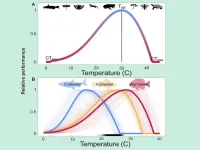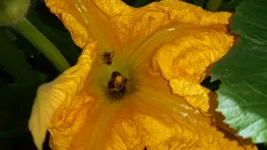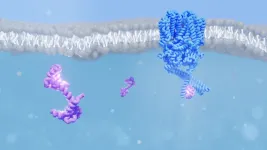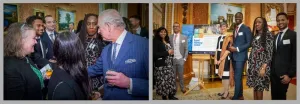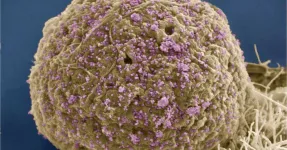Generosity is left-wing
Answers from 46,000 people in 68 countries show that the tendency to be altruistic is less common in association with conservative ideologies.
2023-04-03
(Press-News.org)
Is the tendency to share with other people linked to political orientation? And in which way? In a new study, researchers from the IMT School for Advanced Studies Lucca, Ca’ Foscari University of Venice, and University of Milan Bicocca show that around the world left-leaning people are more inclined to be altruistic, in general and towards the international community. On the other hand, conservative and right people tend to be more altruistic towards their country. What might sound like the confirmation of a prejudice, is in reality a tendency observed worldwide through a survey that covered 68 countries.
For the study, just published in the Proceedings of the National Academy of Sciences (PNAS), Veronica Pizziol and colleagues analyzed the data collected on more than 46,000 participants in 68 countries, between April and May 2020. The survey was organized by the International Collaboration on the Social and Moral Psychology of COVID-19 (ICSMP COVID-19), which examines psychological factors underlying the attitudes and behavioral intentions related to COVID-19.
Using the participants' answers, the study aimed to investigate if and how political ideology, which of course captures one’s beliefs and values about society, is associated with generosity. To measure political ideology, participants were asked to identify their political orientation on a scale from 0 (very left-leaning) to 10 (very right-leaning). To measure generosity, researchers used participants’ donation decisions in a task with the possibility of donating to a national charity and an international one. The task consisted in answering what percentage of a sum of money people kept for themselves, and how much they gave to a national or international charity working to protect people from COVID-19.
Hence, three different types of generosity were taken into consideration and analyzed: one oriented toward the native country, having its roots in localism, named national generosity; the second, more universalistic, oriented beyond the national boundaries and toward the international community, called international generosity; the third, the sum of the two, identifying generosity in general.
“Analyzing the answers, we found that more left-leaning individuals are more likely to donate in general and also more likely to be generous internationally. More right-leaning people are more likely instead to donate nationally. These findings are very consistent and have been checked to exclude other factors that might have influenced the answers,” explains Veronica Pizziol, PhD student in Economics at the IMT School, and first author of the paper. “For example, since the survey was realized during the COVID-19 pandemic, right-leaning people could have shown to be less generous towards COVID-19 charities just because they were less likely to believe COVID-19 to be a big threat. But this was not the case”.
The global coverage of the dataset allowed the researchers to draw general conclusions about the relationship between political ideology and generosity and to use country-level factors to investigate its underlying mechanisms. “We found that a relevant source of cross-country variation is the quality of governance as measured by the Worldwide Governance Indicator provided by the World Bank. We show that the quality of governance moderates the three correlations between political ideology and the various measures of generosity” says Roberto Di Paolo, Assistant Professor at the IMT School. In other words, the tendency to be generous with national and international communities, both among right- and left-wing people, is somehow related to how good the governance of national institutions is.
In particular, in countries with a good quality of the institutions, individuals tend to increase self-interest (with the change being “faster” for right-leaning individuals) and decrease national generosity (with the change being “slower” for right-leaning individuals). Instead, right- and left-leaning individuals adopt opposite behaviors toward an international charity when the quality of governance increases: right-leaning individuals tend to donate less while left-leaning individuals tend to donate more. “These apparently counterintuitive results suggest that, in countries with high quality of governance, left-leaning people may shift towards different values: they can tend to embrace either universalistic or individualist values that are typically brought forward by countries with high quality of governance. Both these values put little emphasis on local boundaries. On the other hand, in countries with high quality of governance, right-leaning people may react negatively to universalist values through a cultural backlash, and therefore embrace only the individualist values. And this is reflected on the fact that they increase only in their individualism”, explains Valerio Capraro, Associate Professor at University of Milan Bicocca, and senior author of the paper.
In sum, in an increasingly globalized world, it is important to understand how generosity becomes able to transcend local boundaries. This paper shows that political ideology plays a relevant role.
END
ELSE PRESS RELEASES FROM THIS DATE:
2023-04-03
UNIVERSITY PARK, Pa. — In the face of a warming climate that is having a profound effect on global biodiversity and will change the distribution and abundance of many animals, a Penn State-led research team has developed a statistical model that improves estimates of habitat suitability and extinction probability for cold-blooded animals as temperatures climb.
Cold-blooded animals — a diverse group including fish, reptiles, amphibians and insects — comprise most species on Earth. The body temperature of cold-blooded animals is strongly influenced by the temperature of their environment. Because their growth, reproductive success ...
2023-04-03
Images
By directly measuring greenhouse gas emissions from an airplane flying over the Gulf of Mexico, a University of Michigan-led team found that the nation's largest offshore fossil fuel production basin has twice the climate warming impact as official estimates.
The work could have bearing on future energy production in the gulf, as decisions about expanding oil and gas harvesting depend on calculations of the climate impact.
While a gap between reported and measured methane emissions in the basin has been noted in the past, this study is believed ...
2023-04-03
UNIVERSITY PARK, Pa. — While pollinator populations of many species have plummeted worldwide, one bee species is blowing up the map with its rapid population expansion. The key to this insect’s success? Its passion for pumpkins, zucchinis, and other squashes, and the massive increase in cultivation of these crops across North America over the last 1,000 years.
A new study led by Penn State found that the squash bee (Eucera pruinosa) has evolved in response to intensifying agriculture — namely squashes in the genus ...
2023-04-03
HOUSTON – (April 3, 2023) – 2D materials get their strength from their atom-thin, sheetlike structure. However, stacking multiple layers of a 2D material will sap it of the qualities that make it so useful.
Rice University materials scientist Jun Lou and collaborators at the University of Maryland showed that fine-tuning interlayer interactions in a class of 2D polymers known as covalent organic frameworks (COFs) can determine the materials’ loss or retention of desirable ...
2023-04-03
Using cryo-electron microscopy and mass spectrometry, researchers from PSI have deciphered the structure of an ion channel found in the eye while it interacts with the protein calmodulin – a structure that has eluded scientists for three decades. They believe that this interaction could explain how our eyes can achieve such remarkable sensitivity to dim light. Their results are published in the journal PNAS.
As you look at the bright screen of your phone or computer, ion channels in your eyes close in response to the light. This is the final step of a biochemical ...
2023-04-03
They’re considered some of the strongest materials on the planet, but tapping that strength has proved to be a challenge.
2D materials, thinner than the most delicate onionskin paper, have attracted intense interest because of their incredible mechanical properties. Those properties, however, dissipate when the materials are stacked in multiple layers, thus limiting their usefulness.
“Think of a graphite pencil,” says Teng Li, Keystone Professor at the University of Maryland’s (UMD) Department of Mechanical Engineering. “Its core is made of graphite, and graphite ...
2023-04-03
WASHINGTON, D.C., April 3, 2023 — The latest issues of three of the American Psychiatric Association’s journals, The American Journal of Psychiatry, Psychiatric Services, and The American Journal of Psychotherapy, are now available online.
The April issue of The American Journal of Psychiatry features genetic, neuroimaging, and behavioral neuroscience studies that focus on the underpinnings of mood disorders, psychotic disorders, autism, and stress-related disorders. Highlights from the issue:
Lower Availability of Mitochondrial Complex I in Anterior Cingulate Cortex in ...
2023-04-03
A PhD researcher from the University of Huddersfield’s Global Disaster Resilience Centre (GDRC) was invited by His Majesty The King and The Queen Consort to attend a special reception at Buckingham Palace and more, in celebration of Commonwealth Day 2023.
Malith Senevirathne is a PhD student at the GDRC, within the University’s School of Applied Sciences and a Research Assistant for the CORE project (sCience and human factOr for Resilient sociEty), funded by the European Commission. As ...
2023-04-03
A North Carolina State University-led study found it is possible to retrieve forensically relevant information from human DNA in household dust. After sampling indoor dust from 13 households, the researchers were able to detect DNA from household residents over 90% of the time, and DNA from non-occupants 50% of the time. The work could be a way to help investigators find leads in difficult cases.
Specifically, the researchers were able to obtain single nucleotide polymorphisms, or SNPs, from the dust samples. SNPs are sites within the genome that vary between individuals – corresponding ...
2023-04-03
The National Institute of Allergy and Infectious Diseases (NIAID), part of the National Institutes of Health, has awarded a five-year, $15.45 million grant to the San Diego Center for AIDS Research (SD CFAR) at UC San Diego, renewing support that extends back to an original establishing grant in 1994 at the height of the AIDS epidemic.
"The grant renewal represents NIAID's continued and enduring investment in our mission to be a critical regional resource in HIV research and education, to advance the discovery and development of ...
LAST 30 PRESS RELEASES:
[Press-News.org] Generosity is left-wing
Answers from 46,000 people in 68 countries show that the tendency to be altruistic is less common in association with conservative ideologies.
